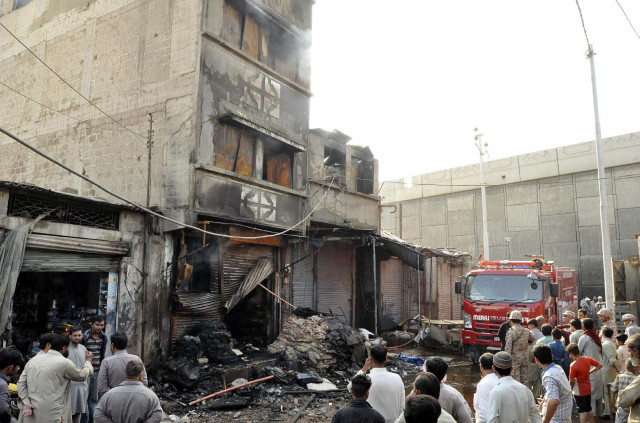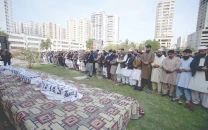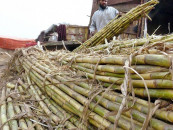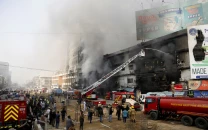Is Sindh ready for natural disasters or all-out war?
Province's civil defence apparatus appears in shambles as NGOs attempt to plug gaps without any coordination...

Rescue efforts: Firefighters attempt to douse a fire that broke out at a warehouse in Shershah Market on Thursday. The city's preparedness for an emergency situation has left a question mark on the authorities
Ultimately, Pakistani statesmanship and external pressure were able to dissuade India from escalating hostilities. But while Pakistan's response to Indian intrusion reaffirmed Pakistanis' faith in their forces' defence capabilities, the entire episode has pointed out glaring gaps elsewhere.
Pakistan's military may be fully capable of responding to any aggressive adventure, but is the country's civil apparatus prepared to deal with the fallout from any potential conflict or even a natural disaster?
The situation is particularly worrisome in Karachi, Pakistan's largest metropolis and the heart of its economy. Neither the Sindh government nor the district authorities have made adequate arrangements or even chalked out a comprehensive strategy for large-scale rescue and relief efforts should the country face war or any other calamity.
India escalating tensions for political reasons: Qureshi
What strategy?
Sindh government departments and local administrative units are not prepared to carry out civil defence measures or arrange necessary awareness campaigns and drills to prevent chaos in the city. Making things worse, there is also an acute shortage of funds, fire tenders, machinery and other equipment needed to manage disasters.
The absence of a centralised control room to monitor and respond to fallout from conflict or disaster and the unavailability of data on available resources adds more fuel to this fire.
The Civil Defence Department and the Provincial Disaster Management Authority (PDMA) are also dysfunctional while the District Disaster Management Authorities (DDMA) has not yet been set up.
A survey by The Express Tribune revealed that the responsibility to perform relief work in case of war or natural disaster lies with the Karachi Metropolitan Corporation (KMC), the district municipal corporations, Karachi Port Trust (KPT), the cantonment boards and the Defence Housing Authority.
However, in the absence of administrative capabilities on the part of the government, it is the welfare organisations - equipped with trained staffers and volunteers and stocked with adequate funds, ambulances, mobile hospitals, funeral buses and mortuaries - that are not only providing the services in Karachi but also operate in rural areas of Sindh.
They also provide firefighting equipment and ensure the provision of food supplies and medicines in calamity-hit regions. In addition to NGOs, both KPT and KMC have a number of fire brigades and urban rescue services.
While this may give some sense of relief, there is also little to no coordination between government bodies and NGOs. Although former Karachi commissioner Shoaib Siddiqui tried to bring all government and non-government bodies on the same page, he was transferred to another city in 2016 after which all coordination efforts came to a complete halt and were not pursued further.
Warning signs
In the wake of recent Pakistan-India tensions, the Sindh government put Karachi on high alert and directed relevant bodies to provide details of their rescue machinery. Provincial and district government representatives held a few meetings but no action was taken. As a result, neither the Sindh home ministry nor district authorities compiled data on available rescue machinery.
Furthermore, the Sindh Civil Defence Department has not been functional for 30 years due to official negligence and lack of funds. Only 135 of 308 department posts are filled and many offices in Sindh have no staff altogether. Meanwhile, the siren system has been out of order since 1990. Only the department's director has access to a van; other staff members do not even have cars.
"The department faces an acute shortage of funds and manpower. There is an ongoing hiring freeze because of which several positions remain vacant," said Sindh Civil Defence Department Director Khadim Hussain Bhutto. While he informed The Express Tribune that the department currently has over 1,000 trained volunteers who have been alerted to take prompt action in case of emergency, he admitted that he does not have list of the volunteers' names.
Civil Defence Department Assistant Director of Training Khursheed Baig, when contacted, claimed volunteers' data was available at all of the department's district offices.
"All volunteers are highly skilled and registered with Civil Defence. Staff members will be a call away if there is a war or catastrophe," he said. Baig added that the department has also provided basic rescue training to around 27,000 people from all walks of life.
Fire fighting
In Karachi, the KMC Fire Brigade is tasked with rescue operations in the event of any calamity. Despite limited resources and not enough firefighters or equipment, the fire brigade has been at the forefront of disaster relief in the city thanks to highly-committed and well-trained staff. The department has lost 20 firefighters in the line of duty.
"Of 48 fire tenders that we have, only 22 are in working condition," said KMC Fire Brigade Deputy Chief Fire Officer Imtiaz Afzal. "We only have 513 firefighters with vacancies for 264 more due to a ban on hiring," he added.
KMC also has an Urban Search and Rescue (USAR) department to rescue people trapped in disaster situations. Although the department has some machinery and advanced equipment donated by the administration of Boston, US, according USAR in-charge Muhammad Humayun, 70% of it is non-functional.
According to The Express Tribune survey, KPT has made preparations to deal with disasters and a siren system is in place to warn people if a war breaks out. Surveyed officers revealed that KPT is equipped with fire tenders and other equipment, however, concerned officers refused to provide further details.
Many NGOs are working as aid organisations in Sindh to tackle emergency situations. An example is the Sindh Boy Scouts Association that carries out different programmes, exercises and training courses to stay up to date with international standards. Similarly, Edhi Welfare carries out rescue operations whenever there is an emergency situation. With a network of offices sprawled over 15 cities of Karachi and Sindh where its ambulance service is able to reach emergency sites within minutes.
Other NGOs include the Alamgir Welfare Trust, the Hilal-e-Ahmar (Red Crescent), Chhipa Welfare Association, Saylani Welfare Trust and Al-Khidmat Foundation.
According to experts, in case of war, disaster or any other untoward incident that has the potential to cause large-scale destruction, Karachi is not prepared to tackle the situation. Therefore, there is an urgent need for government bodies to coordinate with NGOs and be on the same page, so that the city can smoothly handle and manage disasters in an efficient way.



















COMMENTS
Comments are moderated and generally will be posted if they are on-topic and not abusive.
For more information, please see our Comments FAQ